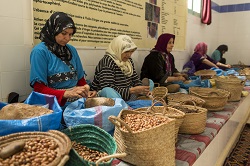Moroccan agricultural strategy to support rural women’s full potential reviewed
The Green Morocco Plan (GMP) was launched in 2008 to drive development of the country’s agricultural potential. To be spread out over 12 years up to 2020, the GMP targets structural and sector reforms to improve the lives of millions of rural Moroccans. An outstanding majority of this population depends on agriculture. With sole support of a Marie Skłodowska-Curie (MSC) grant, the EWTEK project examined the socioeconomic development impacts of the GMP on rural women. This group remains poorly integrated in Moroccan society. “The main goal of the EWTEK project was to evaluate whether women were able to gain economic and social status in the context of new economic directives prescribed by the GMP,” says Dr Bernadette Montanari, the project fellow. Top-down policies miss target groups The interdisciplinary study drew on insights from ethnobiology, development studies and geography. EWTEK first set out to determine the main motivations behind the Moroccan government’s choice of gender policies. The team then identified what key factors and conditions of the GMP facilitated women’s gains in social status and economic development. The combined approach allowed an analysis of local needs from both a micro and macro dimension against a background of top-down directives. For example, Dr Montanari found that although policies that claim socioeconomic development have been put in place, “many rural women were not able to join the initiatives.” Reasons for this include “a lack of consultation, illiteracy, participatory approaches and geographical isolation.” Also, despite there being policies claiming gender equality and empowerment, women who were able to participate in the initiatives merely represented a labour force. They fell “under the management of educated people and sometimes worked without remuneration,” the fellow explains. Finally, EWTEK investigated whether Moroccan women’s traditional ecological knowledge was used as a lever to support income-generating activities and enhance socioeconomic development. Results show that this knowledge was readily integrated and crucial for development of products derived from natural resources, which machines cannot substitute, yet it was not recognised. That is, Dr Montanari elaborates, “the managers or the local authorities did not recognise the value of these traditional processes.” The importance of social norms and cultural context Project work “contributes to the understanding of rural poverty, and the factors that maintain communities in socioeconomic exclusion,” Dr Montanari states. Its research also reveals how difficult and complex it is to apply top-down directives in isolated communities. The MSC fellow underlines another important implication of EWTEK findings: “For development initiatives to be successful, the communities’ inherent attributes, social norms and cultural context must be integrated.” EWTEK activities and outcomes have been presented at universities, international symposiums, and round tables in the Netherlands, Canada, India, Mexico, Morocco, Nicaragua and the United States. The fellow has contributed a book chapter titled ‘Gendered sphere of traditional knowledge in Morocco’, and two co-authored articles related to project findings are currently under review. During the EWTEK project, Dr Montanari also wrote a policy brief, and taught a course on ethnobotany and development(opens in new window) at the University of Mizoram and gave a lecture at the University of Lucknow in India. Dr Montanari is continuing with initiatives aimed at helping rural women develop community social enterprise. In a forthcoming project, she will conduct a comparative study of how rural women achieve this across four countries in three continents.







